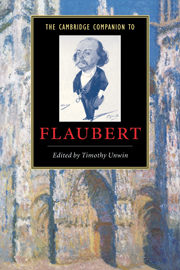Book contents
- Frontmatter
- 1 Gustave Flaubert, the hermit of Croisset
- 2 Flaubert’s place in literary history
- 3 Flaubert’s early work
- 4 Flaubert’s travel writings
- 5 Flaubert’s correspondence
- 6 History and its representation in Flaubert’s work
- 7 Death and the post mortem in Flaubert’s works
- 8 The art of characterisation in Flaubert’s fiction
- 9 The stylistic achievements of Flaubert’s fiction
- 10 The writing process
- 11 Flaubert and the visual
- 12 The theatre in the work of Flaubert
- 13 Flaubert’s failure
- 14 Flaubert, our contemporary
- Select bibliography
- Index
- Series List
9 - The stylistic achievements of Flaubert’s fiction
Published online by Cambridge University Press: 28 May 2006
- Frontmatter
- 1 Gustave Flaubert, the hermit of Croisset
- 2 Flaubert’s place in literary history
- 3 Flaubert’s early work
- 4 Flaubert’s travel writings
- 5 Flaubert’s correspondence
- 6 History and its representation in Flaubert’s work
- 7 Death and the post mortem in Flaubert’s works
- 8 The art of characterisation in Flaubert’s fiction
- 9 The stylistic achievements of Flaubert’s fiction
- 10 The writing process
- 11 Flaubert and the visual
- 12 The theatre in the work of Flaubert
- 13 Flaubert’s failure
- 14 Flaubert, our contemporary
- Select bibliography
- Index
- Series List
Summary
Flaubert is the foremost nineteenth-century French innovator in prose style. But he had pioneering predecessors and like-minded contemporaries: the century was one in which the best writers treated prose as an experimental medium. Its relationship to poetry was both manipulated in practice and discussed in debates that became ideological as well as aesthetic. There is no sharp chronological dividing line. In the first decade or so of the nineteenth century, prose works such as Constant's Adolphe (1816) were still using a spare, maxim-studded style that owes much to the deft economy and bareness of the best seventeenth- and eighteenth-century writers. However, a new kind of prose had been emerging as from the end of the eighteenth century: Rousseau's Rêveries du promeneur solitaire (1782) has been hailed as the work that began to move towards the Romanticism of the early nineteenth century, not only because of its often wistful introspection but also because of the fluid, rhythmic style in which it celebrated both thought and 'nature'. And in the same period that Adolphe was being composed, Chateaubriand was writing lush narratives like René (1802), reliant on a vocabulary designed to evoke an undefined awe ('immense', 'confused', 'majestic'), on sighing cadences, on self-pitying exclamations and on extended similes. Whilst some of these similes are successful, others strike us now, at least, as clumsily overelaborate (such as one in which Chateaubriand compares the setting sun to the pendulum of the clock of the centuries slowly oscillating in a golden fluid). However that may be, Chateaubriand did have a 'poetic' conception of prose, and his stress on the imprecision of feelings (le vague des passions) bore fruit.
- Type
- Chapter
- Information
- The Cambridge Companion to Flaubert , pp. 145 - 164Publisher: Cambridge University PressPrint publication year: 2004
- 3
- Cited by



